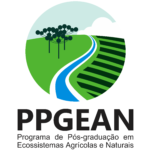ABOUT PPGEAN
The Graduate Program in Agricultural and Natural Ecosystems (PPGEAN) at the Universidade Federal de Santa Catarina (UFSC) began its activities in 2016. PPGEAN with a master’s degree program. Nine years later, in the second semester of 2025, PPGEAN expanded its scope by inaugurating a doctoral program. Both programs are recognized by CAPES in the field of Agricultural Sciences I, with a concentration area in “Management and Conservation of Agricultural and Natural Ecosystems”. The program aims to conduct both basic and applied research directed towards agricultural and natural ecosystems, with a focus on biodiversity maintenance, environmental impact assessment, and the conservation of soil, water resources, plants, animals, and microorganisms.
Within its concentration area, the program seeks to understand the relationships between anthropogenic activities and biodiversity, considering the ongoing interaction processes between the physical environment, genetic resources, management systems, and practices used by culturally diverse populations. This holistic approach allows for a better understanding of complexities with the goal of proposing alternatives for the sustainability of production systems. The program acknowledges the importance of interactions between these ecosystems and the need to educate professionals capable of assessing, planning, and managing natural and agricultural systems within the framework of resource conservation as an integral part of the productive strategy.
The underlying assumption in PPGEAN considers the conservation of natural ecosystems as an integral part of productive strategies. This concept is supported in the preamble of the Convention on Biological Diversity (CBD): “Aware that conservation and sustainable use of biological diversity is of critical importance for meeting the food, health and other needs of the growing world population, for which purpose access to and sharing of both genetic resources and technologies are essential”.
In this context, PPGEAN aims to prepare qualified human resources in Agricultural Sciences capable of systematizing, generating, and sharing scientific and technological knowledge related to agricultural production systems within a mosaic of cultural and natural landscapes, referred to as agricultural ecosystems, considering their interdependence and inseparability from natural ecosystems.







